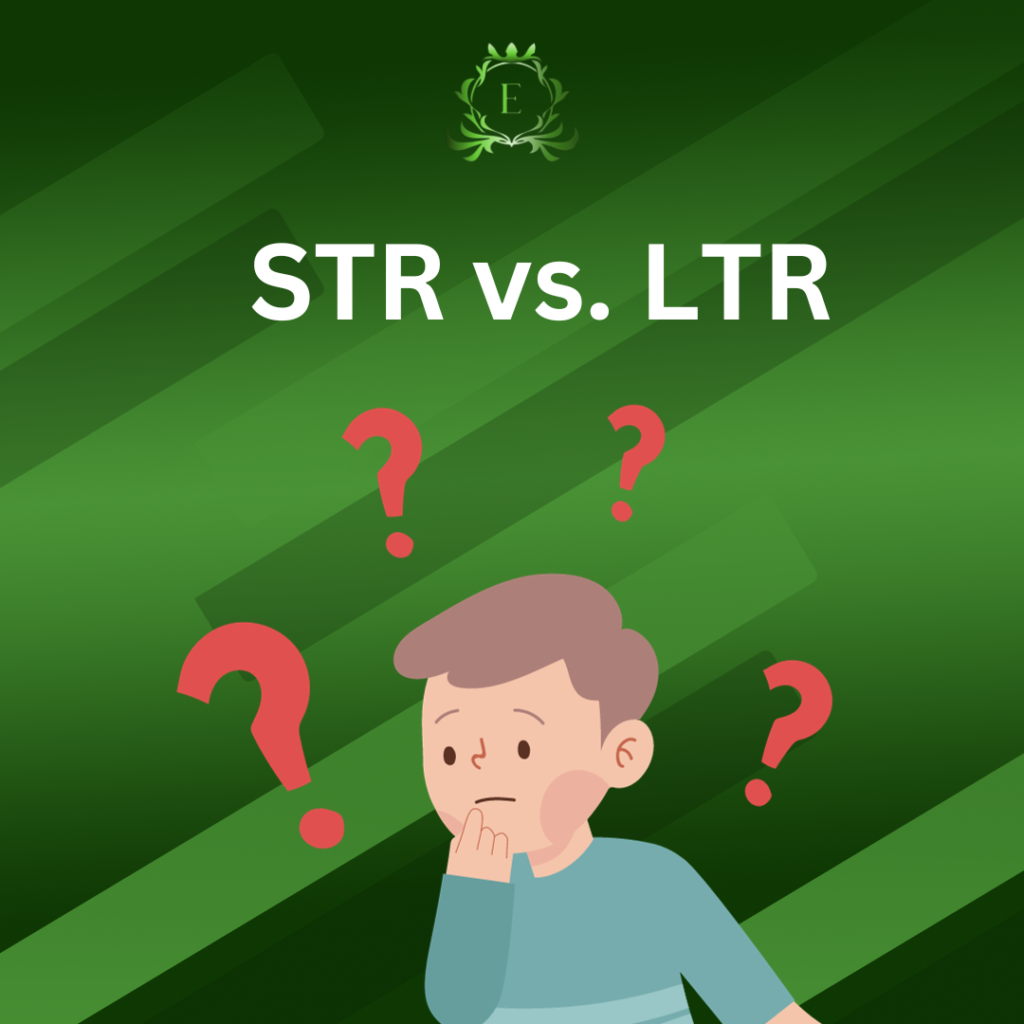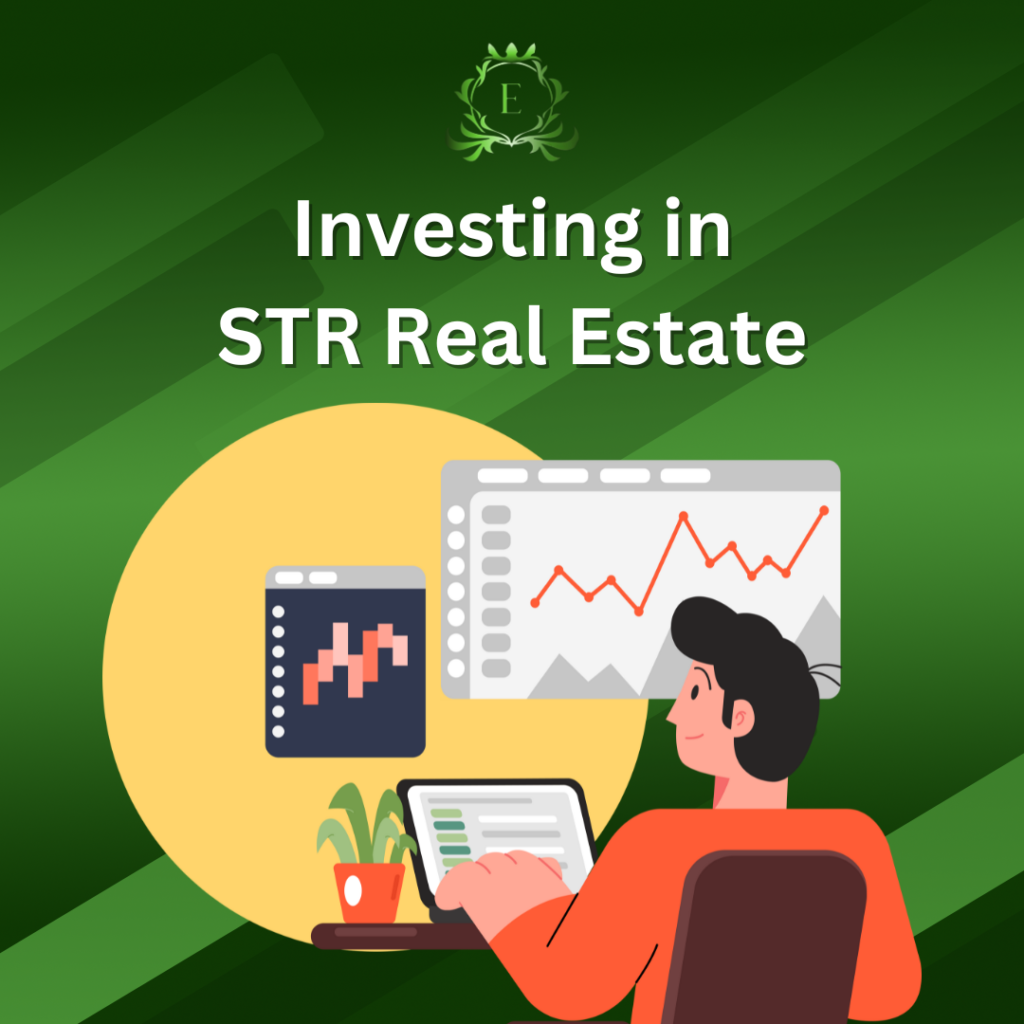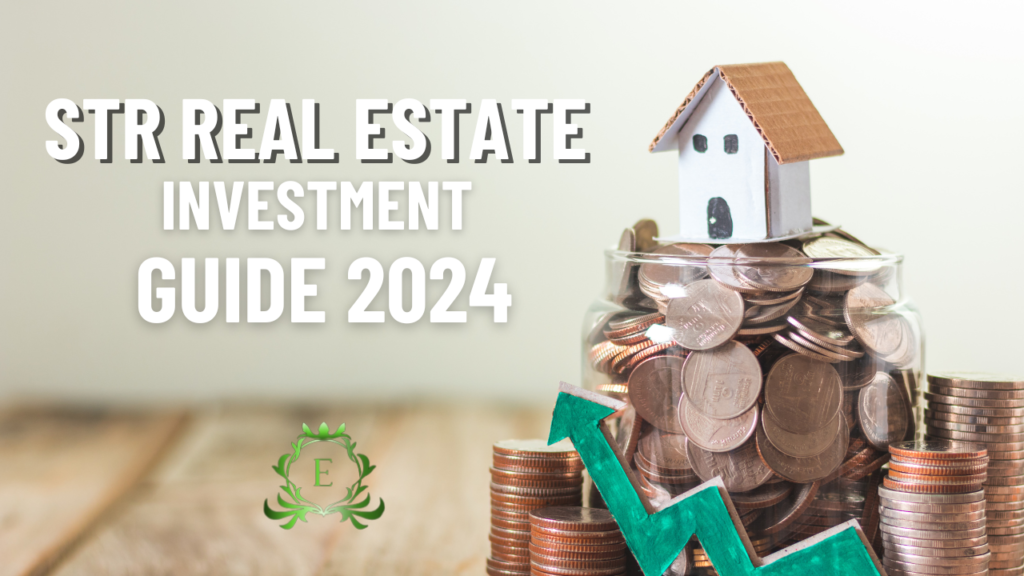Introduction
“Invest in real estate and buy when others are selling.” – J. Paul Getty

The world of real estate investing is constantly evolving, and today, a new trend is taking center stage: short-term rentals (STRs). Offering flexible and dynamic returns, STRs have become an enticing opportunity for savvy investors looking to diversify their portfolios.
In this article, we will look at STRs, their potential, and the main differences between short-term and long-term rentals.
Unveiling the World of Short-Term Rentals (STRs)
Short-term rentals (STRs) refer to properties that are rented out for shorter durations, typically ranging from a few days to a few months. These rentals are for various guests, such as visitors, tourists, and business travelers who require temporary Lodging. Investing in STRs requires careful market evaluation, where understanding demand, market trends, and regulatory landscape play a pivotal role.
STR vs. LTR: Understanding the Difference

Knowing the differences between short-term rentals (STRs) and long-term rentals (LTRs) helps in making smarter investment decisions. Short-term rentals (STRs) provide flexibility and higher earnings by adjusting rental rates based on market demand.
On the other hand, long-term rentals (LTRs) offer stability and a consistent income. However, LTRs lack the flexibility and potential for dynamic pricing seen in STRs.
The Rise of STRs and the Changing Landscape
Websites like Airbnb, HomeAway, and VRBO have changed the housing market with short-term rentals. These platforms connect property owners and travelers, making it easy for both parties to communicate and interact.
Before, people mainly stayed in hotels or classic bed and breakfasts when traveling. Online platforms now offer a wide range of cozy and special places to stay that match what people want and like. From cozy apartments in bustling city centers to luxurious villas nestled in serene countryside, the options are virtually endless.
For property owners, these platforms offer an incredible opportunity to monetize their unused or Underused spaces.
People can easily share their spare rooms, apartments, or vacation homes with guests worldwide by listing them online. This helps owners earn more money and display their properties to people worldwide.
Moreover, short-term rentals often offer a more personalized and immersive experience compared to traditional Lodging. Travelers can choose to stay in special, culturally important places, fully experiencing the local culture and way of life.
Many travelers appreciate Realness and local experiences, creating memorable connections with the places they visit.
However, the rise of short-term rentals has not been without its challenges.
Some cities and neighborhoods worry about these platforms affecting local housing markets. Homes that used to be for long-term rentals are now becoming short-term rentals. This has led to increased competition for housing and rising rental prices in some areas.
To address these worries, cities have made rules to control short-term rentals. These rules might restrict rental days, need licenses, or require taxes on rental income.
Websites like Airbnb, HomeAway, and VRBO have changed real estate by making short-term rentals more popular. They’ve given property owners the power to make money from their spaces. Short-term rentals have many advantages compared to traditional long-term rentals, helping both property owners and travelers.
Benefits and Advantages of STR Investments
Prospective property owners can reap the following advantages by investing in STR real estate:
- Short-term rentals typically generate higher profits compared to regular long-term rentals. As a result, they are an attractive option for investors seeking significant financial gains.
- Property owners can use their properties when empty, for personal use in quieter times, or for hosting loved ones.
- Certain properties in popular tourist areas or emerging markets can significantly appreciate in value over time. This can contribute to the accumulation of long-term wealth.
- Variety: Investing in STR real estate provides mixing things up within a real estate portfolio, reducing exposure to market fluctuations and enhancing overall stability.
Challenges and Considerations of STR Investments
While STR investing offers enticing benefits, it’s essential to consider the following factors:
- Operation and Management: STR properties require active management, including tasks such as guest communication, cleaning, and maintenance. These responsibilities can be time-consuming if not outsourced, demanding careful planning and organization.
- Regulatory Compliance: Each city or region may have its own set of regulations and restrictions on short-term rentals.
- Seasonal Changes: STR income can be highly dependent on tourism seasons, resulting in income fluctuations throughout the year. Property owners need to account for potential periods of lower occupancy and plan accordingly.
- Increased Competition: As the popularity of STRs rises, so does the competition among property owners. This can affect how many guests stay and how much to charge for rent. To stay competitive, it needs good marketing and making the property stand out.
Is Investing in STR Real Estate a Wise Choice in 2024?

Looking ahead to 2024, the potential of short-term rentals (STRs) as a lucrative investment avenue remains highly promising. STRs, known as vacation rentals, are popular as they can earn property owners significant income.
STRs are a good investment as they can make more money than regular long-term rentals. Property owners can make more money by renting out their properties for short periods. This is especially true during busy times or in popular areas. This helps them make the most money from renting and potentially earn much more than with a long-term lease.
Furthermore, STRs offer a level of flexibility that is highly attractive to both property owners and renters. Short-term rentals (STRs) are different from long-term rentals because they don’t need a fixed lease agreement. Property owners can rent out their properties for shorter periods, like a few days, weeks, or months. Property owners can use their properties for personal use and make money when the property is empty.
Also, STRs can easily adjust to market changes, making them a profitable investment option. The vacation rental market changes a lot of things as the time of year, events, and popular travel styles. STRs enable property owners to adjust rental rates and availability based on market conditions. This allows them to capitalize on busy periods and maximize their rental income.
Online platforms and booking websites have made it easier for property owners to market and manage their vacation rentals. These platforms help property owners get more guests and fill up their properties by reaching more potential renters.
They also offer tools and resources to assist property owners in simplifying the booking process. They also help with handling payments and managing guest communication. This makes managing STRs easier and more convenient.
In conclusion, the potential of STRs as a lucrative investment avenue in 2024 remains highly promising. Investors like them because they can make more money, give property owners options, and adjust to market changes. As vacation rentals grow and technology improves, short-term rentals will remain a profitable investment in the future.
However, investing in STR real estate requires strategic decision-making, up-to-date market intelligence, regulatory compliance, and proactive property management. People like STRs because they can make more money, have flexibility, and adapt to market changes. Investors can earn profits by using STRs in the real estate market.
“In real estate, you make 10% of your money because you’re a genius and 90% because you catch a great wave.” – Jeff Greene
Check more articles:





